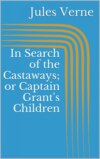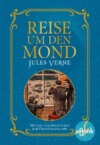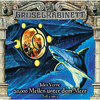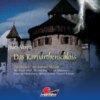Buch lesen: «In Search of the Castaways; or Captain Grant's Children», Seite 7
Chapter XIV.
Providentially Rescued
THE eastern side of the Cordilleras of the Andes consists of a succession of lengthened declivities, which slope down almost insensibly to the plain. The soil is carpeted with rich herbage, and adorned with magnificent trees, among which, in great numbers, were apple-trees, planted at the time of the conquest, and golden with fruit. There were literally, perfect forests of these. This district was, in fact, just a corner of fertile Normandy.
The sudden transition from a desert to an oasis, from snowy peaks to verdant plains, from Winter to Summer, can not fail to strike the traveler's eye.
The ground, moreover, had recovered its immobility. The trembling had ceased, though there was little doubt the forces below the surface were carrying on their devastating work further on, for shocks of earthquake are always occurring in some part or other of the Andes. This time the shock had been one of extreme violence. The outline of the mountains was wholly altered, and the Pampas guides would have sought vainly for the accustomed landmarks.
A magnificent day had dawned. The sun was just rising from his ocean bed, and his bright rays streamed already over the Argentine plains, and ran across to the Atlantic. It was about eight o'clock.
Lord Glenarvan and his companions were gradually restored to animation by the Major's efforts. They had been completely stunned, but had sustained no injury whatever. The descent of the Cordilleras was accomplished; and as Dame Nature had conveyed them at her own expense, they could only have praised her method of locomotion if one of their number, and that one the feeblest and youngest, the child of the party, had not been missing at the roll call.
The brave boy was beloved by everybody. Paganel was particularly attached to him, and so was the Major, with all his apparent coldness. As for Glenarvan, he was in absolute despair when he heard of his disappearance, and pictured to himself the child lying in some deep abyss, wildly crying for succor.
"We must go and look for him, and look till we find him," he exclaimed, almost unable to keep back his tears. "We cannot leave him to his fate. Every valley and precipice and abyss must be searched through and through. I will have a rope fastened round my waist, and go down myself. I insist upon it; you understand; I insist upon it. Heaven grant Robert may be still alive! If we lose the boy, how could we ever dare to meet the father? What right have we to save the captain at the cost of his son's life?"
Glenarvan's companions heard him in silence. He sought to read hope in their eyes, but they did not venture to meet his gaze.
At last he said,
"Well, you hear what I say, but you make no response. Do you mean to tell me that you have no hope—not the slightest?"
Again there was silence, till McNabbs asked:
"Which of you can recollect when Robert disappeared?"
No one could say.
"Well, then," resumed the Major, "you know this at any rate. Who was the child beside during our descent of the Cordilleras?"
"Beside me," replied Wilson.
"Very well. Up to what moment did you see him beside you? Try if you can remember."
"All that I can recollect is that Robert Grant was still by my side, holding fast by a tuft of lichen, less than two minutes before the shock which finished our descent."
"Less than two minutes? Mind what you are saying; I dare say a minute seemed a very long time to you. Are you sure you are not making a mistake?"
"I don't think I am. No; it was just about two minutes, as I tell you."
"Very well, then; and was Robert on your right or left?"
"On my left. I remember that his poncho brushed past my face."
"And with regard to us, how were you placed?"
"On the left also."
"Then Robert must have disappeared on this side," said the Major, turning toward the mountain and pointing toward the right: "and I should judge," he added, "considering the time that has elapsed, that the spot where he fell is about two miles up. Between that height and the ground is where we must search, dividing the different zones among us, and it is there we shall find him."
Not another word was spoken. The six men commenced their explorations, keeping constantly to the line they had made in their descent, examining closely every fissure, and going into the very depths of the abysses, choked up though they partly were with fragments of the plateau; and more than one came out again with garments torn to rags, and feet and hands bleeding. For many long hours these brave fellows continued their search without dreaming of taking rest. But all in vain. The child had not only met his death on the mountain, but found a grave which some enormous rock had sealed forever.
About one o'clock, Glenarvan and his companions met again in the valley. Glenarvan was completely crushed with grief. He scarcely spoke. The only words that escaped his lips amid his sighs were,
"I shall not go away! I shall not go away!"
No one of the party but could enter into his feeling, and respect it.
"Let us wait," said Paganel to the Major and Tom Austin. "We will take a little rest, and recruit our strength. We need it anyway, either to prolong our search or continue our route."
"Yes; and, as Edward wishes it, we will rest. He has still hope, but what is it he hopes?"
"Who knows!" said Tom Austin.
"Poor Robert!" replied Paganel, brushing away a tear.
The valley was thickly wooded, and the Major had no difficulty in finding a suitable place of encampment. He chose a clump of tall carob trees, under which they arranged their few belongings—few indeed, for all they had were sundry wraps and fire-arms, and a little dried meat and rice. Not far off there was a RIO, which supplied them with water, though it was still somewhat muddy after the disturbance of the avalanche. Mulrady soon had a fire lighted on the grass, and a warm refreshing beverage to offer his master. But Glenarvan refused to touch it, and lay stretched on his poncho in a state of absolute prostration.
So the day passed, and night came on, calm and peaceful as the preceding had been. While his companions were lying motionless, though wide awake, Glenarvan betook himself once more to the slopes of the Cordilleras, listening intently in hope that some cry for help would fall upon his ear. He ventured far up in spite of his being alone, straining his ear with painful eagerness to catch the faintest sound, and calling aloud in an agony of despair.
But he heard nothing save the beatings of his own heart, though he wandered all night on the mountain. Sometimes the Major followed him, and sometimes Paganel, ready to lend a helping hand among the slippery peaks and dangerous precipices among which he was dragged by his rash and useless imprudence. All his efforts were in vain, however, and to his repeated cries of "Robert, Robert!" echo was the only response.
Day dawned, and it now became a matter of necessity to go and bring back the poor Lord from the distant plateau, even against his will. His despair was terrible. Who could dare to speak of quitting this fatal valley? Yet provisions were done, and Argentine guides and horses were not far off to lead them to the Pampas. To go back would be more difficult than to go forward. Besides, the Atlantic Ocean was the appointed meeting place with the DUNCAN. These were strong reasons against any long delay; indeed it was best for all parties to continue the route as soon as possible.
McNabbs undertook the task of rousing Lord Glenarvan from his grief. For a long time his cousin seemed not to hear him. At last he shook his head, and said, almost in-audibly:
"Did you say we must start?"
"Yes, we must start."
"Wait one hour longer."
"Yes, we'll wait another," replied the Major.
The hour slipped away, and again Glenarvan begged for longer grace. To hear his imploring tones, one might have thought him a criminal begging a respite. So the day passed on till it was almost noon. McNabbs hesitated now no longer, but, acting on the advice of the rest, told his cousin that start they must, for all their lives depended on prompt action.
"Yes, yes!" replied Glenarvan. "Let us start, let us start!"
But he spoke without looking at McNabbs. His gaze was fixed intently on a certain dark speck in the heavens. Suddenly he exclaimed, extending his arm, and keeping it motionless, as if petrified:
"There! there! Look! look!"
All eyes turned immediately in the direction indicated so imperiously. The dark speck was increasing visibly. It was evidently some bird hovering above them.
"A condor," said Paganel.
"Yes, a condor," replied Glenarvan. "Who knows? He is coming down—he is gradually getting lower! Let us wait."
Paganel was not mistaken, it was assuredly a condor. This magnificent bird is the king of the Southern Andes, and was formerly worshiped by the Incas. It attains an extraordinary development in those regions. Its strength is prodigious. It has frequently driven oxen over the edge of precipices down into the depths of abysses. It seizes sheep, and kids, and young calves, browsing on the plains, and carries them off to inaccessible heights. It hovers in the air far beyond the utmost limits of human sight, and its powers of vision are so great that it can discern the smallest objects on the earth beneath.
What had this condor discovered then? Could it be the corpse of Robert Grant? "Who knows?" repeated Glenarvan, keeping his eye immovably fixed on the bird. The enormous creature was fast approaching, sometimes hovering for awhile with outspread wings, and sometimes falling with the swiftness of inert bodies in space. Presently he began to wheel round in wide circles. They could see him distinctly. He measured more than fifteen feet, and his powerful wings bore him along with scarcely the slightest effort, for it is the prerogative of large birds to fly with calm majesty, while insects have to beat their wings a thousand times a second.
The Major and Wilson had seized their carbines, but Glenarvan stopped them by a gesture. The condor was encircling in his flight a sort of inaccessible plateau about a quarter of a mile up the side of the mountain. He wheeled round and round with dazzling rapidity, opening and shutting his formidable claws, and shaking his cartilaginous carbuncle, or comb.
"It is there, there!" exclaimed Glenarvan.
A sudden thought flashed across his mind, and with a terrible cry, he called out, "Fire! fire! Oh, suppose Robert were still alive! That bird."
But it was too late. The condor had dropped out of sight behind the crags. Only a second passed, a second that seemed an age, and the enormous bird reappeared, carrying a heavy load and flying at a slow rate.
A cry of horror rose on all sides. It was a human body the condor had in his claws, dangling in the air, and apparently lifeless—it was Robert Grant. The bird had seized him by his clothes, and had him hanging already at least one hundred and fifty feet in the air. He had caught sight of the travelers, and was flapping his wings violently, endeavoring to escape with his heavy prey.
"Oh! would that Robert were dashed to pieces against the rocks, rather than be a—"
He did not finish his sentence, but seizing Wilson's carbine, took aim at the condor. His arm was too trembling, however, to keep the weapon steady.
"Let me do it," said the Major. And with a calm eye, and sure hands and motionless body, he aimed at the bird, now three hundred feet above him in the air.
But before he had pulled the trigger the report of a gun resounded from the bottom of the valley. A white smoke rose from between two masses of basalt, and the condor, shot in the head, gradually turned over and began to fall, supported by his great wings spread out like a parachute. He had not let go his prey, but gently sank down with it on the ground, about ten paces from the stream.
"We've got him, we've got him," shouted Glenarvan; and without waiting to see where the shot so providentially came from, he rushed toward the condor, followed by his companions.
When they reached the spot the bird was dead, and the body of Robert was quite concealed beneath his mighty wings. Glenarvan flung himself on the corpse, and dragging it from the condor's grasp, placed it flat on the grass, and knelt down and put his ear to the heart.
But a wilder cry of joy never broke from human lips, than Glenarvan uttered the next moment, as he started to his feet and exclaimed:
"He is alive! He is still alive!"
The boy's clothes were stripped off in an instant, and his face bathed with cold water. He moved slightly, opened his eyes, looked round and murmured, "Oh, my Lord! Is it you!" he said; "my father!"
Glenarvan could not reply. He was speechless with emotion, and kneeling down by the side of the child so miraculously saved, burst into tears.
Chapter XV.
Thalcave
ROBERT had no sooner escaped one terrible danger than he ran the risk of another scarcely less formidable. He was almost torn to pieces by his friends, for the brave fellows were so overjoyed at the sight of him, that in spite of his weak state, none of them would be satisfied without giving him a hug. However, it seemed as if good rough hugging did not hurt sick people; at any rate it did not hurt Robert, but quite the contrary.
But the first joy of deliverance over, the next thought was who was the deliverer? Of course it was the Major who suggested looking for him, and he was not far off, for about fifty paces from the RIO a man of very tall stature was seen standing motionless on the lowest crags at the foot of the mountain. A long gun was lying at his feet.
He had broad shoulders, and long hair bound together with leather thongs. He was over six feet in height. His bronzed face was red between the eyes and mouth, black by the lower eyelids, and white on the forehead. He wore the costume of the Patagonians on the frontiers, consisting of a splendid cloak, ornamented with scarlet arabesques, made of the skins of the guanaco, sewed together with ostrich tendons, and with the silky wool turned up on the edge. Under this mantle was a garment of fox-skin, fastened round the waist, and coming down to a point in front. A little bag hung from his belt, containing colors for painting his face. His boots were pieces of ox hide, fastened round the ankles by straps, across.
This Patagonian had a splendid face, indicating real intelligence, notwithstanding the medley of colors by which it was disfigured. His waiting attitude was full of dignity; indeed, to see him standing grave and motionless on his pedestal of rocks, one might have taken him for a statue of sang-froid.
As soon as the Major perceived him, he pointed him out to Glenarvan, who ran toward him immediately. The Patagonian came two steps forward to meet him, and Glenarvan caught hold of his hand and pressed it in his own. It was impossible to mistake the meaning of the action, for the noble face of the Scotch lord so beamed with gratitude that no words were needed. The stranger bowed slightly in return, and said a few words that neither Glenarvan nor the Major could understand.
The Patagonian surveyed them attentively for a few minutes, and spoke again in another language. But this second idiom was no more intelligible than the first. Certain words, however, caught Glenarvan's ear as sounding like Spanish, a few sentences of which he could speak.
"ESPANOL?" he asked.
The Patagonian nodded in reply, a movement of the head which has an affirmative significance among all nations.
"That's good!" said the Major. "Our friend Paganel will be the very man for him. It is lucky for us that he took it into his head to learn Spanish."
Paganel was called forthwith. He came at once, and saluted the stranger with all the grace of a Frenchman. But his compliments were lost on the Patagonian, for he did not understand a single syllable.
However, on being told how things stood, he began in Spanish, and opening his mouth as wide as he could, the better to articulate, said:
"Vos sois um homen de bem." (You are a brave man.)
The native listened, but made no reply.
"He doesn't understand," said the geographer.
"Perhaps you haven't the right accent," suggested the Major.
"That's just it! Confound the accent!"
Once more Paganel repeated his compliment, but with no better success.
"I'll change the phrase," he said; and in slow, deliberate tones he went on, "Sam duvida um Patagao" (A Patagonian, undoubtedly).
No response still.
"DIZEIME!" said Paganel (Answer me).
But no answer came.
"Vos compriendeis?" (Do you understand?) shouted Paganel, at the very top of his voice, as if he would burst his throat.
Evidently the Indian did not understand, for he replied in Spanish,
"No comprendo" (I do not understand).
It was Paganel's turn now to be amazed. He pushed his spectacles right down over his nose, as if greatly irritated, and said,
"I'll be hanged if I can make out one word of his infernal patois. It is Araucanian, that's certain!"
"Not a bit of it!" said Glenarvan. "It was Spanish he spoke."
And addressing the Patagonian, he repeated the word, "ESPANOL?" (Spanish?).
"Si, si" (yes, yes) replied the Indian.
Paganel's surprise became absolute stupefaction. The Major and his cousin exchanged sly glances, and McNabbs said, mischievously, with a look of fun on his face, "Ah, ah, my worthy friend; is this another of your misadventures? You seem to have quite a monopoly of them."
"What!" said Paganel, pricking up his ear.
"Yes, it's clear enough the man speaks Spanish."
"He!"
"Yes, he certainly speaks Spanish. Perhaps it is some other language you have been studying all this time instead of—"
But Paganel would not allow him to proceed. He shrugged his shoulders, and said stiffly,
"You go a little too far, Major."
"Well, how is it that you don't understand him then?"
"Why, of course, because the man speaks badly," replied the learned geographer, getting impatient.
"He speaks badly; that is to say, because you can't understand him," returned the Major coolly.
"Come, come, McNabbs," put in Glenarvan, "your supposition is quite inadmissable. However DISTRAIT our friend Paganel is, it is hardly likely he would study one language for another."
"Well, Edward—or rather you, my good Paganel—explain it then."
"I explain nothing. I give proof. Here is the book I use daily, to practice myself in the difficulties of the Spanish language. Examine it for yourself, Major," he said, handing him a volume in a very ragged condition, which he had brought up, after a long rummage, from the depths of one of his numerous pockets. "Now you can see whether I am imposing on you," he continued, indignantly.
"And what's the name of this book?" asked the Major, as he took it from his hand.
"The LUSIADES, an admirable epic, which—"
"The LUSIADES!" exclaimed Glenarvan.
"Yes, my friend, the LUSIADES of the great Camoens, neither more nor less."
"Camoens!" repeated Glenarvan; "but Paganel, my unfortunate fellow, Camoens was a Portuguese! It is Portuguese you have been learning for the last six weeks!"
"Camoens! LUISADES! Portuguese!" Paganel could not say more. He looked vexed, while his companions, who had all gathered round, broke out in a furious burst of laughter.
The Indian never moved a muscle of his face. He quietly awaited the explanation of this incomprehensible mirth.
"Fool, idiot, that I am!" at last uttered Paganel. "Is it really a fact? You are not joking with me? It is what I have actually been doing? Why, it is a second confusion of tongues, like Babel. Ah me! alack-a-day! my friends, what is to become of me? To start for India and arrive at Chili! To learn Spanish and talk Portuguese! Why, if I go on like this, some day I shall be throwing myself out of the window instead of my cigar!"
To hear Paganel bemoan his misadventures and see his comical discomfiture, would have upset anyone's gravity. Besides, he set the example himself, and said:
"Laugh away, my friends, laugh as loud as you like; you can't laugh at me half as much as I laugh at myself!"
"But, I say," said the Major, after a minute, "this doesn't alter the fact that we have no interpreter."
"Oh, don't distress yourself about that," replied Paganel, "Portuguese and Spanish are so much alike that I made a mistake; but this very resemblance will be a great help toward rectifying it. In a very short time I shall be able to thank the Patagonian in the language he speaks so well."
Paganel was right. He soon managed to exchange a few words with the stranger, and found out even that his name was Thalcave, a word that signified in Araucanian, "The Thunderer." This surname had, no doubt, come from his skill in handling fire-arms.
But what rejoiced Glenarvan most was to learn that he was a guide by occupation, and, moreover, a guide across the Pampas. To his mind, the meeting with him was so providential, that he could not doubt now of the success of their enterprise. The deliverance of Captain Grant seemed an accomplished fact.
When the party went back to Robert, the boy held out his arms to the Patagonian, who silently laid his hand on his head, and proceeded to examine him with the greatest care, gently feeling each of his aching limbs. Then he went down to the RIO, and gathered a few handfuls of wild celery, which grew on the banks, with which he rubbed the child's body all over. He handled him with the most exquisite delicacy, and his treatment so revived the lad's strength, that it was soon evident that a few hours' rest would set him all right.
It was accordingly decided that they should encamp for the rest of the day and the ensuing night. Two grave questions, moreover, had to be settled: where to get food, and means of transport. Provisions and mules were both lacking. Happily, they had Thalcave, however, a practised guide, and one of the most intelligent of his class. He undertook to find all that was needed, and offered to take him to a TOLDERIA of Indians, not further than four miles off at most, where he could get supplies of all he wanted. This proposition was partly made by gestures, and partly by a few Spanish words which Paganel managed to make out. His offer was accepted, and Glenarvan and his learned friend started off with him at once.
They walked at a good pace for an hour and a half, and had to make great strides to keep up with the giant Thalcave. The road lay through a beautiful fertile region, abounding in rich pasturages; where a hundred thousand cattle might have fed comfortably. Large ponds, connected by an inextricable labyrinth of RIOS, amply watered these plains and produced their greenness. Swans with black heads were disporting in the water, disputing possession with the numerous intruders which gamboled over the LLANOS. The feathered tribes were of most brilliant plumage, and of marvelous variety and deafening noise. The isacus, a graceful sort of dove with gray feathers streaked with white, and the yellow cardinals, were flitting about in the trees like moving flowers; while overhead pigeons, sparrows, chingolos, bulgueros, and mongitas, were flying swiftly along, rending the air with their piercing cries.
Paganel's admiration increased with every step, and he had nearly exhausted his vocabulary of adjectives by his loud exclamations, to the astonishment of the Patagonian, to whom the birds, and the swans, and the prairies were every day things. The learned geographer was so lost in delight, that he seemed hardly to have started before they came in sight of the Indian camp, or TOLDERIA, situated in the heart of a valley.
About thirty nomadic Indians were living there in rude cabins made of branches, pasturing immense herds of milch cows, sheep, oxen, and horses. They went from one prairie to another, always finding a well-spread table for their four-footed guests.
These nomads were a hybrid type of Araucans, Pehu-enches, and Aucas. They were Ando-Peruvians, of an olive tint, of medium stature and massive form, with a low forehead, almost circular face, thin lips, high cheekbones, effeminate features, and cold expression. As a whole, they are about the least interesting of the Indians. However, it was their herds Glenarvan wanted, not themselves. As long as he could get beef and horses, he cared for nothing else.
Thalcave did the bargaining. It did not take long. In exchange for seven ready saddled horses of the Argentine breed, 100 pounds of CHARQUI, or dried meat, several measures of rice, and leather bottles for water, the Indians agreed to take twenty ounces of gold as they could not get wine or rum, which they would have preferred, though they were perfectly acquainted with the value of gold. Glenarvan wished to purchase an eighth horse for the Patagonian, but he gave him to understand that it would be useless.
They got back to the camp in less than half an hour, and were hailed with acclamations by the whole party or rather the provisions and horses were. They were all hungry, and ate heartily of the welcome viands. Robert took a little food with the rest. He was fast recovering strength. The close of the day was spent in complete repose and pleasant talk about the dear absent ones.
Paganel never quitted the Indian's side. It was not that he was so glad to see a real Patagonian, by whom he looked a perfect pigmy—a Patagonian who might have almost rivaled the Emperor Maximii, and that Congo negro seen by the learned Van der Brock, both eight feet high; but he caught up Spanish phrases from the Indian and studied the language without a book this time, gesticulating at a great rate all the grand sonorous words that fell on his ear.
"If I don't catch the accent," he said to the Major, "it won't be my fault; but who would have said to me that it was a Patagonian who would teach me Spanish one day?"




















